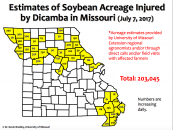JEFFERSON CITY, Mo. – Talk is heating up over the agricultural use of the herbicide dicamba, or more so over the temporary halt to the chemical being used in Missouri.
 Last week, the Missouri Department of Agriculture ordered a temporary end to the use and sale of products containing dicamba after the state had received more than 130 complaints from Missouri farmers this year. They say the chemical drifted onto their land and damaged crops, the majority of them coming from southeast Missouri, but a number of them also coming from the northern half of the state.
Last week, the Missouri Department of Agriculture ordered a temporary end to the use and sale of products containing dicamba after the state had received more than 130 complaints from Missouri farmers this year. They say the chemical drifted onto their land and damaged crops, the majority of them coming from southeast Missouri, but a number of them also coming from the northern half of the state.
The damage has been attributed to a variety of factors like spraying at night, use of generics and tank contamination, but the general consensus is that the herbicide is vaporizing and drifting into nearby fields, where it injures the non-resistant crops.
Missouri is now the second state to halt sales and use of dicamba this year, but Department of Agriculture Director Chris Chinn said the halt is more of a “short pause” to get approved dicamba products back in use. She says that decision depends on companies like BASF and Monsanto changing the restrictions on the product labels.
“We want to protect farmers and their livelihoods. At the same time, my commitment to technology and innovation in agriculture is unwavering,” Chinn said. “That’s why I am asking the makers of these approved post-emergent products, researchers, and farmers to work with us to determine how we can allow applications to resume this growing season, under certain agreed upon conditions.”
The plant that seems to have been hit the hardest is Missouri’s soybean crops. According to a statement from Missouri Soybean Association President Matt McCrate, up to 200,000 soybean acres have been damaged by dicamba products during the 2017 growing season.
But it isn’t the first time that dicamba has made headlines.
Last year, the issue was with illegal usage by farmers, as the herbicide had not yet received approval from regulators. Many claimed that the herbicide was drifting, blaming it for widespread crop damage. But with the dicamba now gaining approval, many hoped the problem would diminish.
Some farmers from the Bootheel tell the Missouri Times that they would never have used the herbicide if they thought it would drift and hurt their neighbors, but the fact is that many of the farmers switched to the new dicamba-tolerant soybeans and cotton to avoid a repeat of last year.
Missouri Farm Bureau President Blake Hurst said that there are no good answers or easy solutions, and it is now on the companies to work with the Department of Agriculture to “find a way forward that protects both farmers at risk of losing their crops to weed infestation and those farmers’ neighbors.”
But the maker of one dicamba herbicide, Creve Coeur-based Monsanto, introduced dicamba-tolerant soybean varieties, as well as cotton, in 2015 and 2016, and their corresponding dicamba spray gained regulatory approval late last year.
And as Arkansas and Missouri crack down on dicamba, the company is working with the state, saying that the dicamba technology is essential for weed control but they are concerned about potential crop injury. They also said they are committed to remaining actively engaged in the state’s process of reviewing the herbicide and are complying with the order.
BASF also issued a statement, saying they have “already proposed the text of such a label to Missouri, according to their direction.”
Both BASF and Monsanto stress the importance of following the label requirements, as well as local requirements. The herbicides instructions include directions for how to apply the dicamba, as well as the proper weather conditions and tools to be used.
But some farmers also say that the ban has put them in a tight spot now, as they’re at a point where they need to do one more run with the herbicide on their crops. The good news for those farmers is that Chinn and the Department of Agriculture say they are hopeful to lift the ban as early as this week.
Benjamin Peters was a reporter for The Missouri Times and Missouri Times Magazine and also produced the #MoLeg Podcast. He joined The Missouri Times in 2016 after working as a sports editor and TV news producer in mid-Missouri. Benjamin is a graduate of Missouri State University in Springfield.









